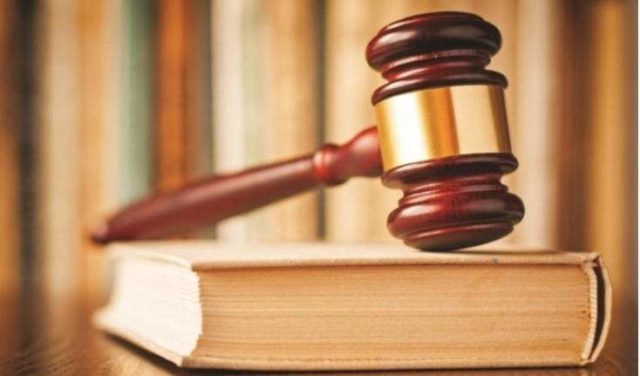
Judge rejects California Jan. 6 suspect’s bid to move trial out of DC because of Biden voters A judge's gavel rests on a book of law. (Dreamstime/TNS)
A federal judge rejected efforts Wednesday by a Northern California man to have his Jan. 6 Capitol breach trial moved out of Washington, D.C., because of arguments that the jailed suspect could not get a fair trial from an overwhelmingly Democratic jury pool that favored the election of President Joe Biden in November 2020.
U.S. District Judge John D. Bates rejected efforts by Auburn construction worker Sean McHugh to have his trial moved to Michigan because of his claim that publicity about the Capitol breach made it impossible for him to get a fair trial.
“The claims that Biden voters will be inflamed against Mr. McHugh because he is accused of trying to nullify their votes is just not plausible,” the judge said at the conclusion of an hourlong hearing in federal court in Washington.
Bates concluded that high-profile trials involving Watergate defendants were able to be held in Washington without issue and that McHugh’s federal defender had not shown that it would be impossible to ferret out biased jurors through pre-trial questioning, or voir dire.
“The voting record of D.C. residents is not sufficient to indicate bias and that jurors would be unable to fairly assess the facts of Mr. McHugh’s case,” the judge said.
As of March, 76.5% of voters in the district were registered Democrats, a 3-to-1 margin over voters who registered as Republicans or had no party preference, according to D.C.’s Board of Elections.
McHugh, one of four Northern California residents charged in the Capitol breach, faces eight felony and two misdemeanor counts, including allegations that he used bear spray against Capitol police officers defending the grounds against protesters.
McHugh has been in custody since his arrest in May 2021 and faces a trial date of Oct. 18, although his federal public defender, Maria Jacob, indicated Wednesday that negotiations to resolve the case without going to trial are continuing.
McHugh had a June trial date set earlier, and Jacob had argued that he could not receive a fair trial in Washington because of the city’s Democratic leanings, publicity about the case and the potential that prospective jurors would bear resentment against defendants accused in the breach.
The breach of the Capitol led to military roadblocks and lockdowns in the district following the attempt to halt the certification of Biden’s Electoral College victory over former President Donald Trump.
“I think this case and all the Jan. 6 prosecutions do show extraordinarily emotional prejudice because it is by far the largest case ever prosecuted in history,” Jacob said, noting that a telephone poll of D.C. residents found 82% of respondents described the actions of Jan. 6 defendants as an “insurrection.”
“Describing something as an insurrection … is basically saying that someone is guilty,” Jacob told the judge.
Assistant U.S. Attorney Mary Dohrmann disputed that, telling Bates that careful questioning of potential jurors from D.C. could provide McHugh a fair trial.
“Voir dire is the mechanism, and it’s simply not borne out that in a major metropolitan area of 700,000 people 14 cannot be seated that will give Mr. McHugh a fair trial,” he argued.
Bates agreed, noting that high-profile prosecutions have taken place in other cities where the crimes occurred and that publicity did not hinder the ability to select an impartial jury.
“We’ve had a lot of high-profile cases in the district where the events occurred, including Watergate,” the judge noted. “Jurors need not enter the box with an empty head in order to determine the facts.”
Bates also concluded that as time passes the media attention given to the Jan. 6 prosecutions diminishes, and said there is no evidence that McHugh has been the subject of particular scrutiny in the D.C. area.
“Although the Jan. 6 riot is an extremely high profile event … Mr. McHugh himself remains essentially anonymous to the jury pool,” the judge said.
Bates ruled against moving the trial without prejudice, telling McHugh’s lawyer she could raise the issue again before trial, if necessary.
The Justice Department says nearly 800 Jan. 6 defendants have been arrested nationwide and that about 211 have pleaded guilty to misdemeanors and 37 have pleaded guilty to felonies, with three found guilty at jury trials.
In addition to McHugh, two other Northern California residents — Jorge Riley of Sacramento and Tommy Frederick Allan of Rocklin — have cases pending in federal court in Washington. A fourth, Valerie Elaine Ehrke of Arbuckle, pleaded guilty to a misdemeanor and was sentenced to probation last September.
___
(c) 2022 The Sacramento Bee Distributed by Tribune Content Agency, LLC




